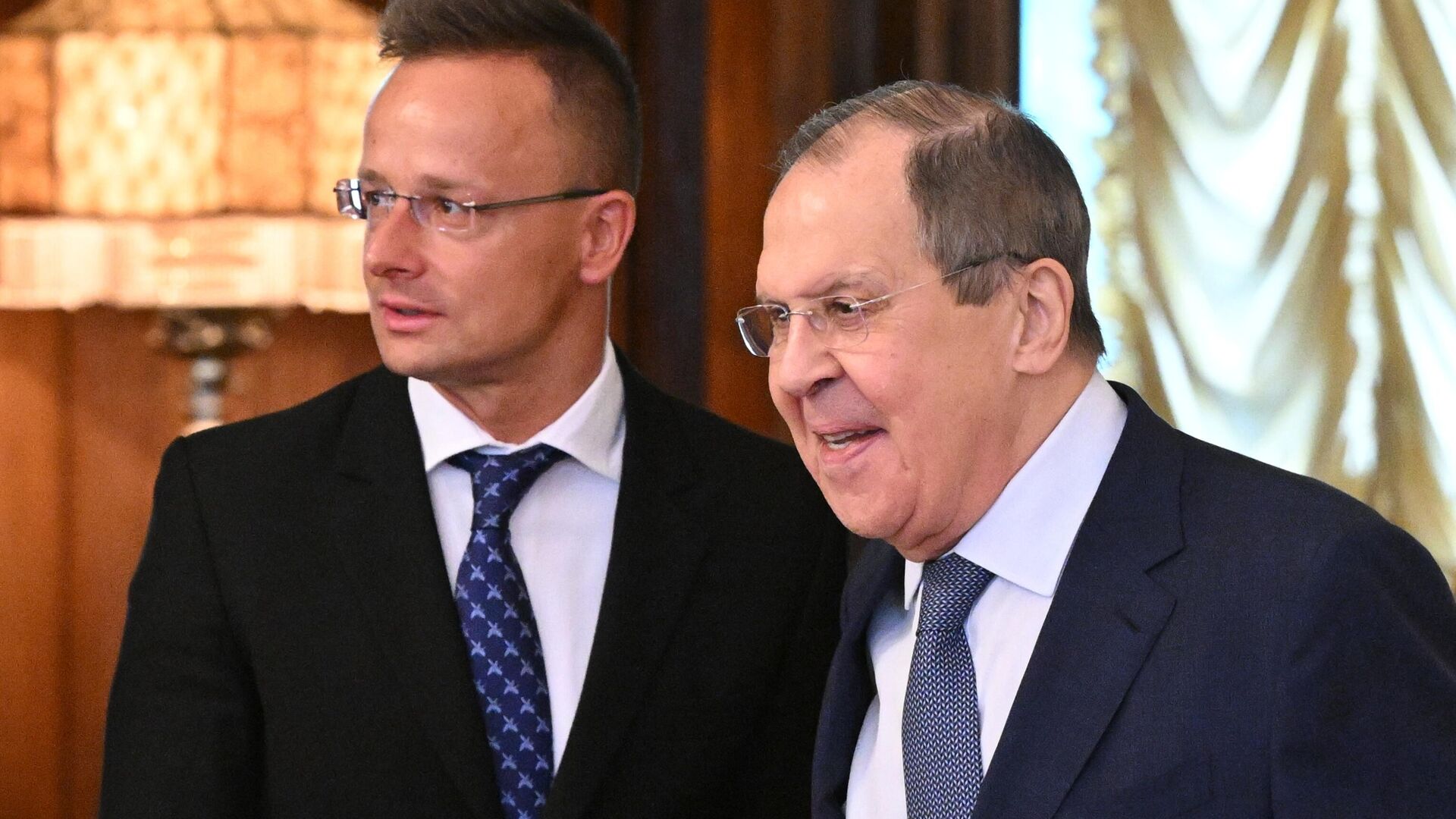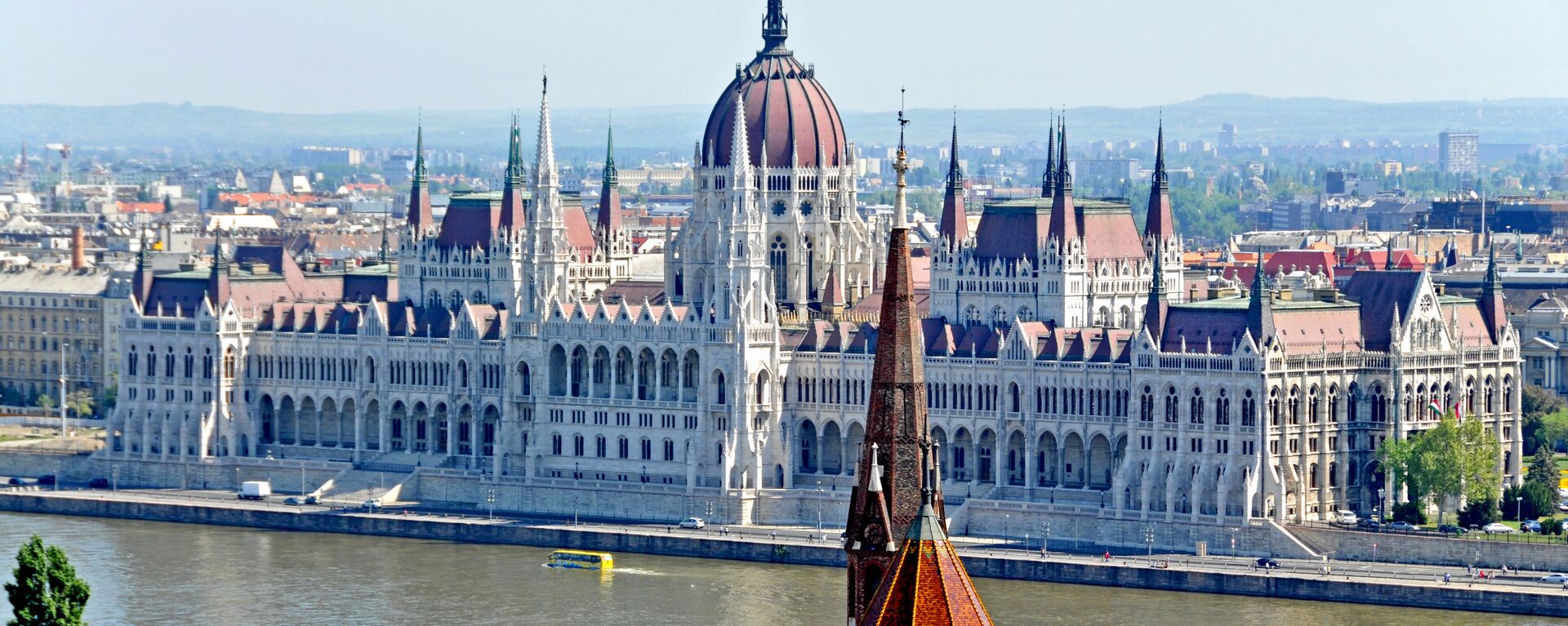https://sputnikglobe.com/20220721/russia-hungary-set-on-implementing-major-projects-including-in-energy-sphere-lavrov-says-1097660195.html
Hungary Wants to Buy Additional Natural Gas From Russia, Lavrov Says
Hungary Wants to Buy Additional Natural Gas From Russia, Lavrov Says
Sputnik International
Hungary has asserted an independent policy unique in the European Union in relation to the Ukrainian crisis, refusing to slap sanctions on Russian energy, and... 21.07.2022, Sputnik International
2022-07-21T13:12+0000
2022-07-21T13:12+0000
2022-08-06T08:31+0000
hungary
sergey lavrov
energy crisis in europe
https://cdn1.img.sputnikglobe.com/img/07e6/07/15/1097661686_0:206:3061:1928_1920x0_80_0_0_2126e7bf8e169800ebcec92bc291ea4f.jpg
Russia and Hungary are intent on advancing their bilateral cooperation, notwithstanding EU sanctions, and are looking to implement major projects, including in the energy sector, Russian Foreign Minister Sergei Lavrov has indicated."We note the mutual commitment of the Russian and Hungarian governments to promote our interaction, our partnership, including in the implementation of major projects in energy, transport and other areas," Lavrov said.The Russian foreign minister indicated that Budapest has expressed interest in buying additional gas supplies from Russia, and that Moscow would consider this request immediately.Hungary imports approximately 65 percent of its oil and some 80 percent of its gas from Russia, and recently refused to cut down amid Brussels' attempts to force a "phase out" of Russian crude supplies."I consider your visit very timely, including for the continuation of our trust-based exchange of views on regional and international issues," Lavrov said.Hungary has refused to toe the line set by its NATO and EU allies amid the Ukraine crisis, calling for an immediate ceasefire as the only possible chance to avoid a steep economic crisis in Europe. Budapest has also been critical of Brussels' tough sanctions against Moscow, saying they threaten to undermine Hungary's own economic and energy security.Last week, Hungarian Prime Minister Viktor Orban suggested that Europe had "shot itself in the lungs" with sanctions, and was now paying the price."At first I thought we just shot ourselves in the foot, but the European economy shot itself in the lungs and is gasping for air," he said. "There are countries committed to the sanctions policy, but Brussels must admit that it was a mistake, that it has not fulfilled its purpose and has even had the opposite effect," Orban added, suggesting that restrictions were hurting the EU much more than Russia.Hungary's relations with Ukraine worsened dramatically after the 2014 coup in Kiev, and the new Ukrainian government's legislative efforts to deprive the community of 150,000 ethnic Hungarian-Ukrainians living in the country's Zakarpattia region of the right to receive a public education in their native tongue. Following the escalation of the Ukraine crisis in February, tensions have degenerated into a bitter war of words, including mutual recriminations about the state of Ukrainian and Hungarian officials' mental health.In May, an advisor to Ukraine's energy minister suggested that "something" should happened to the Soviet-era Druzhba ('Friendship') oil pipeline carrying Russian crude through Ukraine to Hungary to speak to Orban "in the language he understands." The same month, Orban's name was added to a notorious Security Service of Ukraine-curated website containing the personal information of so-called "enemies of Ukraine." Several individuals listed on the website have subsequently been killed.
https://sputnikglobe.com/20220627/hungarian-envoy-dismisses-kievs-lectures-on-ties-with-russia-1096720578.html
hungary
Sputnik International
feedback@sputniknews.com
+74956456601
MIA „Rossiya Segodnya“
2022
News
en_EN
Sputnik International
feedback@sputniknews.com
+74956456601
MIA „Rossiya Segodnya“
Sputnik International
feedback@sputniknews.com
+74956456601
MIA „Rossiya Segodnya“
hungary, sergey lavrov
Hungary Wants to Buy Additional Natural Gas From Russia, Lavrov Says
13:12 GMT 21.07.2022 (Updated: 08:31 GMT 06.08.2022) Hungary has asserted an independent policy unique in the European Union in relation to the Ukrainian crisis, refusing to slap sanctions on Russian energy, and refusing to allow its territory to be used by NATO to transfer weapons to Kiev.
Russia and Hungary are intent on advancing their bilateral cooperation, notwithstanding EU sanctions, and are looking to implement major projects, including in the energy sector, Russian Foreign Minister Sergei Lavrov has indicated.
"Despite the difficult international situation, despite the desire of some of our partners to increase sanctions pressure against Russia, our interaction continues, and last year we managed to overcome the recession caused by the pandemic and to achieve growth of over 25 percent in our trade turnover," Lavrov said, speaking to his Hungarian counterpart Peter Szijjarto in Moscow on Thursday.
"We note the mutual commitment of the Russian and Hungarian governments to promote our interaction, our partnership, including in the implementation of major projects in energy, transport and other areas," Lavrov said.
The Russian foreign minister indicated that Budapest has expressed interest in buying additional gas supplies from Russia, and that Moscow would consider this request immediately.
Hungary imports approximately 65 percent of its oil and some 80 percent of its gas from Russia, and recently refused to cut down amid Brussels' attempts to force a "phase out" of Russian crude supplies.
"I consider your visit very timely, including for the continuation of our trust-based exchange of views on regional and international issues," Lavrov said.
"I know that you are closely following the situation in Ukraine as it develops, including from the point of view of the Hungarian national minority, and today we will be prepared to give you our vision of how our special military operation is developing and about the prospects for resolving this serious crisis," he said.
Hungary has refused to toe the line set by its NATO and EU allies amid the Ukraine crisis,
calling for an immediate ceasefire as the only possible chance to avoid a steep economic crisis in Europe. Budapest has also been critical of Brussels' tough sanctions against Moscow, saying they threaten to undermine Hungary's own economic and energy security.
Last week, Hungarian Prime Minister Viktor Orban suggested that Europe had "shot itself in the lungs" with sanctions, and was now paying the price.
"At first I thought we just shot ourselves in the foot, but the European economy shot itself in the lungs and is gasping for air," he said. "There are countries committed to the sanctions policy, but Brussels must admit that it was a mistake, that it has not fulfilled its purpose and has even had the opposite effect," Orban added, suggesting that restrictions were hurting the EU much more than Russia.
Hungary's relations with Ukraine worsened dramatically after the 2014 coup in Kiev, and the new Ukrainian government's legislative efforts to deprive the community of 150,000 ethnic Hungarian-Ukrainians living in the country's Zakarpattia region of the right to receive a public education in their native tongue. Following the escalation of the Ukraine crisis in February, tensions have degenerated into a bitter war of words, including
mutual recriminations about the state of Ukrainian and Hungarian officials' mental health.
In May, an advisor to Ukraine's energy minister suggested that "something" should happened to the Soviet-era Druzhba ('Friendship') oil pipeline carrying Russian crude through Ukraine to Hungary to speak to Orban
"in the language he understands." The same month, Orban's name was added to a notorious Security Service of Ukraine-curated website containing the personal information of so-called "enemies of Ukraine." Several individuals listed on the website have subsequently been killed.



